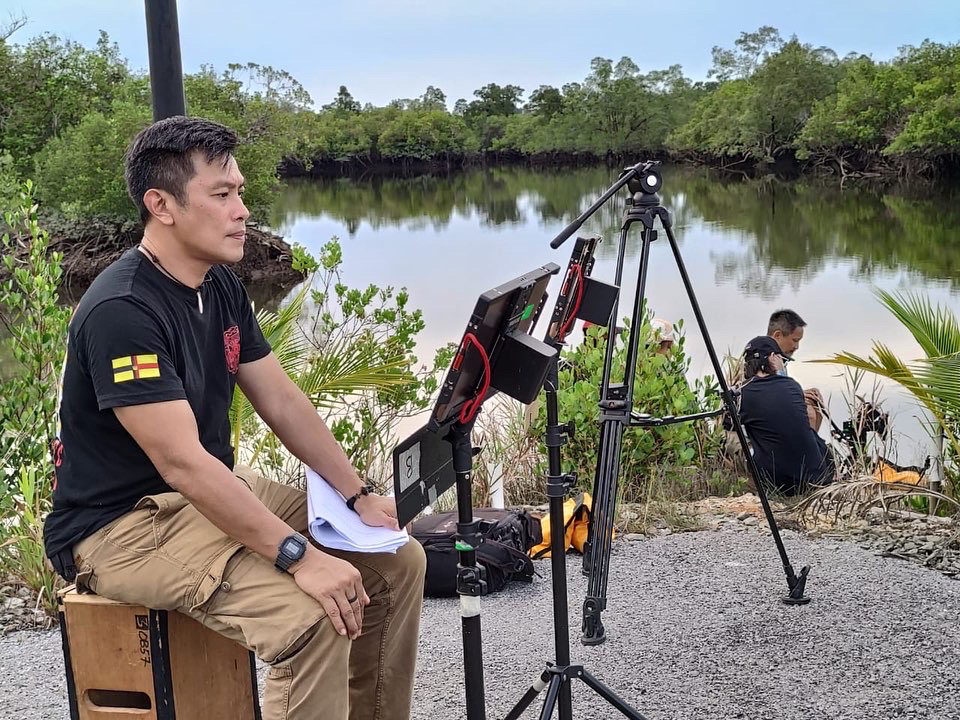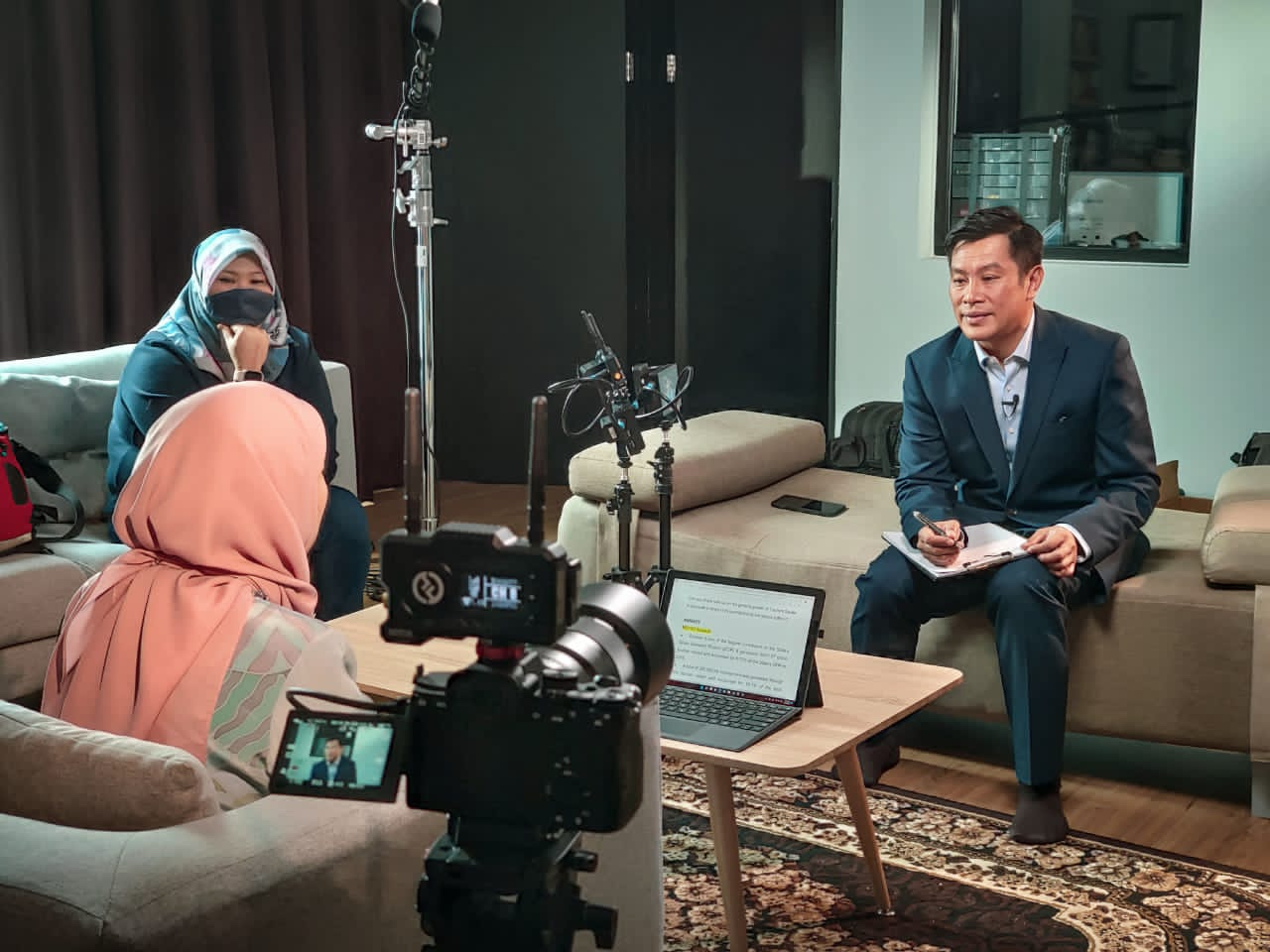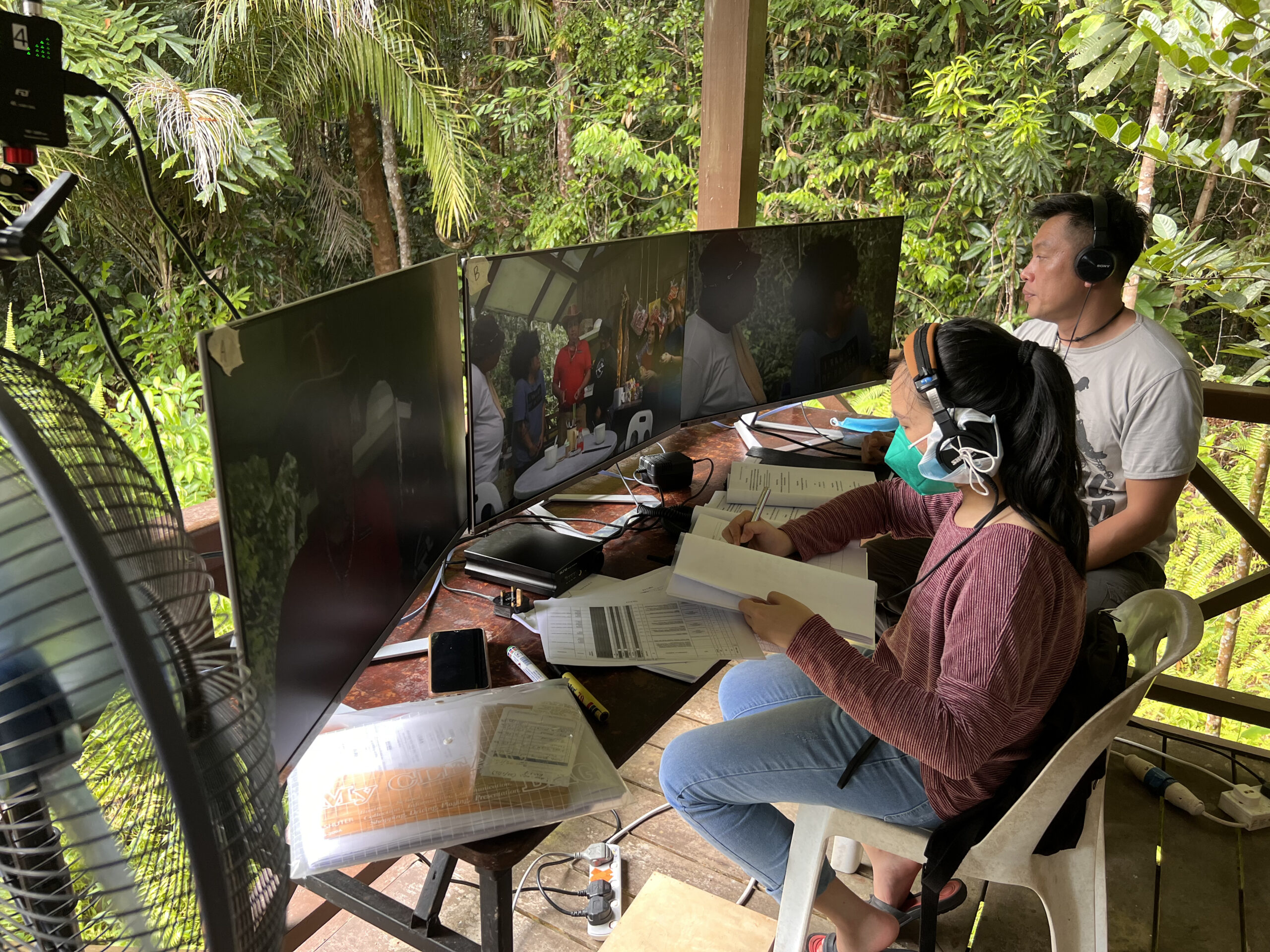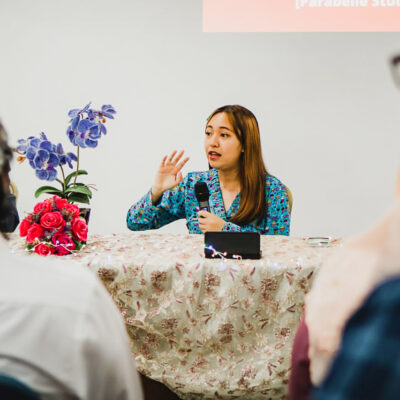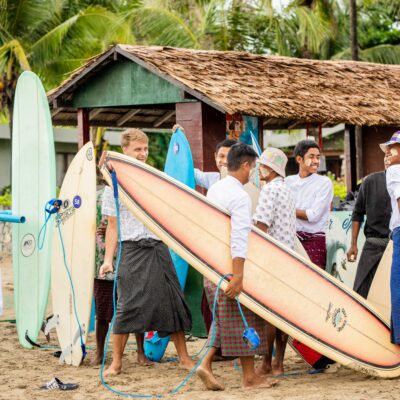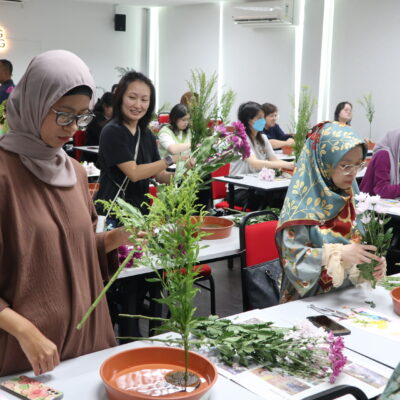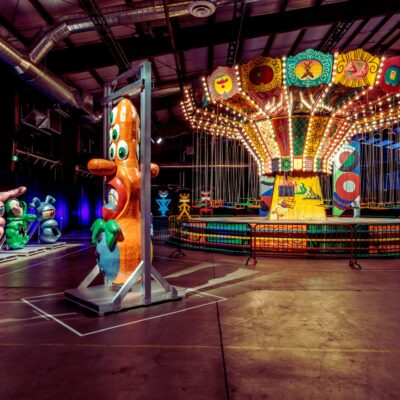Written by Ying Chia |
Funnyman Rashid Salleh has had an illustrious life, to say the least. A brief rundown on his website lists everything from actor, comedian, director, TV host and ESPN anchor; a man who seems to be able to truly have his cake and eat it too. He is perhaps best known for his breakout role as ‘Joe’ in the Malaysian classic sitcom ‘Kopitiam’. We had the honour to chat with this stalwart of the ASEAN entertainment industry about life, leaps of faith and returning home to his native Sarawak.
One of your most famous roles is Joe on Kopitiam, which aired for 7 seasons on NTV7. How did you work with writers and producers to develop Joe into the beloved local character he became?
RASHID SALLEH: Well, we’re going to have to go way back! (laughs) We didn’t have much of a say in the development or characterisation of our roles at first. I was already a theatre actor anyway, and a lot of the cast were theatre actors … we got together to shoot the pilot episode first and we went through a month plus of rehearsals, had discussions on that whilst the script writers wrote around us. I think what happened was we took on the characters and sort of made it our own. By the second of third season, we were very comfortable and people knew what our characters were so it was very easy for the writers to write around us. In fact, some of them even wrote our own mannerisms into the role so it looked natural.
I used to have this tendency to pause in the middle of my sentences and so they’d put a pause there, because they knew I would say something then stop. It was a typical ‘Joe’ thing to stop, think a but and then go on to make sure he said the right thing. I was a rugby player at the time so they wrote that in that I was built and all that. Some of the writers were funny because they would make him take his shirt off and go fro a swim, and I was like “Is that necessary?” (laughs) But over the years, it was a lot easier to play our characters because we knew our characters really, really well as is on any long-running shows. However, if you seen the show, you know when they say art imitates life. If was a bit annoying because people really did think I was stupid (laughs). I was working events at the time and people didn’t take me seriously haha! There I was presenting million-dollar projects and they’re looking at me going “Aren’t you that guy from Kopitiam?”.
This was pre-social media so TV at the time was a big thing, and the internet was really, really slow. And it’s so funny because of that, I was given a lot of romantic comedy roles. There was rarely a time I got to be a villain bun when I did I cherished it. Even between the shoots and everything, I was still going theatre — obviously I would gravitate towards comedy on stage as well.
Do you think you’re inclined to be that funny person or comedian in a group of people?
RASHID SALLEH: Well the irony is that in my family there’s 10 of us; there’s five boys and five girls. My younger brother is the funniest guy and he’s a pilot! I was more of a serious guy. If you look at comedians, you know most of them are really serious people. We tend to take our comedy seriously, which is ironic.
You’ve worked in pretty much all aspects of media. Why were you interested in having those experiences in your repertoire or career?
RASHID SALLEH: Well, I’m the type that loves a challenge and I caught the acting bug when I was 11 or 12 years old at prep school. I did a chorus bit for ‘Oliver’, I did ‘Pirates of Penzance’, and then I won a Best Actor award in college — I played the lead in ‘Oklahoma’. Then I joined Actors Studio in Kuala Lumpur and that’s where I really started. I came back from university and I was working; I just had this feeling that I had to do something about this but back then in the 90’s, you’re young and you need to get on with life, so to speak. So really long story short, (Kopitiam) did really well and my mindset was “I’m going to get more jobs, doesn’t matter what because you’ve got to work”.
And suddenly things were coming along. Somebody asked if I wanted to try voiceovers and I said ‘Why not?’ and during the shooting process I became so interested in how the whole thing worked. I think it was because I came from events and we look at events, the processes of how an event is formed. It’s similar to a shoot but i wanted to be involved in it so I learned a lot of it on the job. I asked silly questions like, “How is the script written like this?, “How do I get to be the director?”. I was really, really lucky to be taught by Othman Hafsham, he’s like a sifu (teacher) for a lot of guys my age.
So there were tons of things going on (with different roles and opportunities) but because I was so enthusiastic about doing it, it was easier for me as I was already in front of the camera anyways. All those experiences that came along were very, very helpful. The big thing came when they said they were looking for ESPN presenters and every boy’s dream, people who love sports, play sports, was there. I said, “Heck yeah!” to the audition. Few months later, they called to say I got the job and we moved to Singapore in 2007. By that time, I’d done film, live shows, TV, and suddenly I had to stop everything because it’s pretty much a full-time job. it was the best three years of my life in terms of my career because I learnt so much. I got to watch sports, I got to talk about it, I got to present about it. It was the first time I did a live show with 20 million viewers. In my third year, I was sort of headhunted because Astro wanted to open a 24 hour fully Bahasa Malaysia sports channel. I said “Yeah, I’ll come in.” but I didn’t extend by contract with ESPN. In hindsight, it would’ve been fun to stay but I wouldn’t have gone through what I went through.
One of my biggest claims to fame was that I managed to get rugby onto the channel and created the only rugby show which was called ‘Ruck and Roll’. Because of the exposure our rugby team got on TV, our national team started getting more attention and people got better. Over the years we’ve been in the premier division in Asia and all that, and I like to think that I had a hand in that — and this is the only time I’m going to go ego — because if we didn’t push for it, people wouldn’t know. They wouldn’t be following and watching it now. It was a great time because everyone was really chuffed that rugby was getting coverage. When you have that passion for a certain sport and you want to push it further, it will happen. So I stayed there for a year and a half because when I was working for ESPN, I went to Timor-Leste to cover their first ever mountain bike race; it was like Tour de France, but on mountain bikes going 17 to 18 kilometers each day through mountain ranges. My friend emailed me while I was at Astro Arena and said, “Hello mate, would you like to work for the President?”. President Jose Ramos-Horta wanted to set up a media unit with the initiative called ‘Peace Begins With Me’ and that really piqued my interests so I took a few months to decide, resigned from Astro Arena and there I was. Two bags packed and I was suddenly in Timor-Leste.
But I’m pretty happy in terms of what I’m doing right now; I actually had dreams of wanting to come back to Sarawak to transfer my knowledge and experience. I was asked to direct a couple of shows, I’ve done writing for four or five shows already, and also set up my company of PR publication. production and post-production. It’s been a nice ride. In a sense, it’s a lot slower but the wonderful thing is I get to transfer the knowledge because I realise that our industry (in Sarawak) is still in its infancy despite having a TV station that’s a few years old. Every station, every channel, always has growing pains you know? I’d like to be able to ease that stage and help grow the industry here in the nxt five to ten years whenever or however I can. That’s my mission in life right now. I don’t think I have anything else to prove to myself, maybe the only thing would be to prove I can teach. The fact that my mother used to be a teacher sort of helps; mum’s side of the family are all in education. I wouldn’t say I have a natural affinity to teach, I’m a very scary teacher (laughs) but it’s nice to know that people have learnt something. I may be a bit stern or firm but they’ve always been thankful for the lessons learnt. That’s what happen to me as well, along the way I met so many people who taught me so many things and I want to do the same.
You also described your Malaysia Film Festival 2007 nominated role as Ah Meng, in Waris Jari Hantu, as a challenging role. Besides the obvious, what were some of the bigger challenges you faced in that job?
RASHID SALLEH: So I got nominated in 2007 at the Malaysia Film Festival Awards, and I remember that clearly because I’d just landed in Jakarta and joined ESPN. I got the call from the producers and they asked me where I was. I said “I’m in Jakarta” and they told me I’d just got nominated at the film festival. I saw the nomination list and these guys, they’re all my peers you know? These people I’ve worked with and my seniors. People who were really, really good — one of them was my idol, and I was so chuffed just to get nominated amongst these guys by playing a transvestite role. However, it was probably one of the most challenging roles I had because we trained for a month plus. Not just on the script but on our characters. The lead actor won Best Actor for Waris Jari Hantu and I got nominated as Best Supporting Actor. We were very well aware of the roles that we played in that film but I was really surprised to be nominated.
When I was given the role, I didn’t want to make it a caricature because if I had I would’ve been lambasted by every transvestite and transgender person, and at that time even though there were a lot of people who didn’t like transgender people I didn’t want … I mean yes, Ah Meng was slightly funny in a way, but we were actually trained by a proper transvestite on how to walk, talk, behave, our mannerisms, everything. To the point where even in the middle of the shooting — and it was the only time I did the method acting thing, just for a bit. I wanted to maintain it because it took about two hours just to put the makeup and everything on, because we had long nails, eyelashes. I really understand what women go through when they put on makeup! (laughs) I used to joke with my ex-wife that I put on more makeup than her. We were doing an outdoor scene in a park and an older lady came up to me and asked me what we were doing. I could have answered as a guy and shocked the heck out of her but I just maintained character and said “I don’t know, I’m also waiting to see what they’re doing ’cause I think they’re shooting something”. We had this whole conversation as my character haha! But going back to that role, it was really tough because it was also a story about people who struggle with their sexuality and struggle to open up, what they have to go through when they do, and that was portrayed really well.
Speaking of work, you’ve been described as one of the most hard working actors in Malaysia — where does that discipline and work ethic come from?
RASHID SALLEH: It comes from rugby actually (laughs). As much as actors are seen for their work, we must remember that you’re only as good as the people around you. So in rugby team you work for each other, and it’s a physical sport. For me, if you don’t work as hard as the guy next to you, you’re gonna lose. And I came from a team called Cobra that regularly won trophies and we were winning tournaments all over the place that decade. We always had this mentality that we were going to win even when I was growing up, I was part of this team that won the county cup. So always this mentality of discipline, winning, motivating yourself and getting things done. It was never about the glamour though that was part and parcel of the job; I always looked at myself as a salesman because you’re the product. If you don’t sell yourself, no one’s gonna buy your services. For me to be seen as hardworking, fine. I didn’t bother about what people thought of me because you have to be thick-skinned in this industry. I remember I was interviewed once and they asked me what I did with my bad reviews. I said, “Very simple. I’ll crumple the paper up and use it as a toilet paper”, haha!
In theatre you’ve got a ton of egos and you’re just got to be able to swim through that and get on with yourself. I’ve always believed you have to give 100 or 110 percent in what you do, and that came from rugby, and still to this day I challenge my younger charges and staff on what else they can do and to keep pushing themselves. Whatever stage you are at in life, keep learning and gaining knowledge, and if you call that hard-working … I don’t know. I don’t intend to stop anytime soon. I’m always looking for multi-taskers. Kids in the industry today are so young. I look around at the industry in Kuching and I’m like, ‘Are there any professional actors?’ because everyone’s still working. The ones who are full-time actors, they’ve gone to Kuala Lumpur and that’s a brain drain. So we’re trying to reverse that. Even with Sabah, Brunei — I would like to see Borneo being built into our own industry because we have so much content and talent here but we just need them to be trained and people need to be patient. I’ve just directed a stand-up comedy show for Astro that’s out now, and I told the producers if they wanted me to direct then fine, but to give (my company) the post=production as well so our guys in Sarawak are getting the necessary experience. They wouldn’t get this opportunity if I didn’t have the network. They wouldn’t be able to because KL’s very competitive and there are SO many production houses. If none of us come back to help, these guys won’t get the opportunities. Obviously, there’s other stuff in the pipeline right now, but I can’t talk about that until it comes to fruition. But when it does, you’ll suddenly see this industry go up in a couple of gears.

